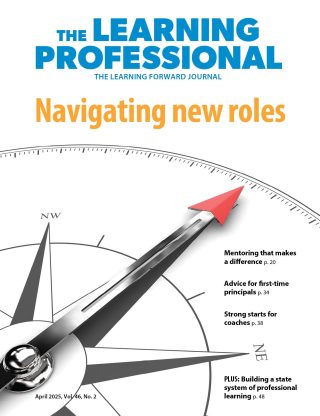FOCUS
ONLINE EXCLUSIVE: How principals lead across content areas
By Jo Beth Jimerson and Sarah Quebec Fuentes
October 2021
Read the remaining content with membership access. Join or log in below to continue.
Sed ut perspiciatis unde omnis iste natus error sit voluptatem accusantium doloremque laudantium, totam rem aperiam, eaque ipsa quae ab illo inventore veritatis et quasi architecto beatae vitae dicta sunt explicabo. Nemo enim ipsam voluptatem quia voluptas sit aspernatur aut odit aut fugit, sed quia consequuntur magni dolores eos qui ratione voluptatem sequi nesciunt. Neque porro quisquam est, qui dolorem ipsum quia dolor sit amet, consectetur, adipisci velit, sed quia non numquam eius modi tempora incidunt ut labore et dolore magnam aliquam quaerat voluptatem.
References
City, E.A. (2011). Learning from instructional rounds. Educational Leadership, 69(2), 36-41.
Covey, S.R. & Merrill, R.R. (2006). The speed of trust: The one thing that changes everything. Simon and Schuster.
Lochmiller, C.R. (2019). Credibility in instructional supervision: A catalyst for differentiated supervision. In M.I. Derrington and K. Brandon (Eds.), Differentiated teacher evaluation and professional learning (pp. 83-105). Palgrave Macmillan. doi.org/10.1007/978-3-030-16454-6_5
Stein, M.K. & Nelson, B.S. (2003). Leadership content knowledge. Educational Evaluation and Policy Analysis, 25(4), 423-448. doi.org/10.3102/01623737025004423
Zepeda, S.J. & Lanoue, P.D. (2017). Conversation walks: Improving instructional leadership. Educational Leadership, 74(8), 58-61.

Jo Beth Jimerson (j.jimerson@tcu.edu) is a professor and the Betty F. Adams chair of education at Texas Christian University.

Recent Issues
LEARNING DESIGNS
February 2025
How we learn influences what we learn. This issue shares essential...
BUILDING BRIDGES
December 2024
Students benefit when educators bridge the continuum of professional...
CURRICULUM-BASED PROFESSIONAL LEARNING
October 2024
High-quality curriculum requires skilled educators to put it into...
LEARNING TO PIVOT
August 2024
Sometimes new information and situations call for major change. This issue...












